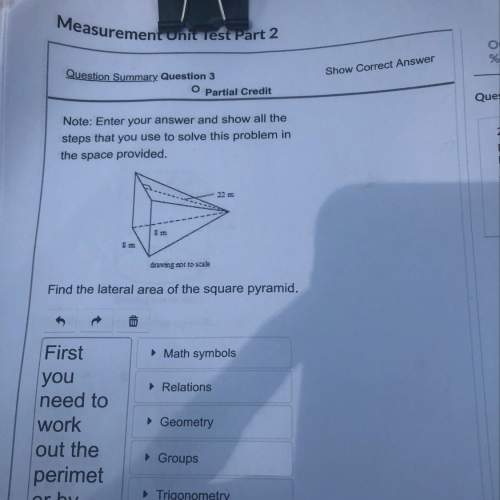
Mathematics, 26.01.2021 01:20 twinkle713derp
Rico thinks it's a perfect square trinomial. Teresa says it's the difference of two squares. Who is correct? Equation: (x^8-6561)

Answers: 3


Another question on Mathematics

Mathematics, 21.06.2019 18:00
On saturday a souvenir shop had 125 customers.sixty four percent of the costumers paid with a credit card. how many costumers paid with cash?
Answers: 1

Mathematics, 21.06.2019 19:10
Find the roots of the polynomial function f(x) = x^3 + 2x^2 + x
Answers: 2

Mathematics, 21.06.2019 22:20
The school track has eight lanes. each lane is 1.25 meters wide. the arc at each end of the track is 180. the distance of the home straight and the radii for the arcs in the 1st 4 lanes are given. s=85m r1=36.5m r2=37.75m r3=39m r4=40.25m part one: find the radii of lanes 5 through 8 of the track. show your work. part two: if max ran around lane one, how far did he run? show your work and explain your solution. part three: max wants to run a total of three laps around the track, choose two additional lanes (2-8) for him to run and find the distance around those two lanes. show your work and round to the hundredths. part 4: based on your lane choices in part three, what was the total distance max ran in the three laps around the track?
Answers: 2

Mathematics, 21.06.2019 22:30
Amachine that produces a special type of transistor (a component of computers) has a 2% defective rate. the production is considered a random process where each transistor is independent of the others. (a) what is the probability that the 10th transistor produced is the first with a defect? (b) what is the probability that the machine produces no defective transistors in a batch of 100? (c) on average, how many transistors would you expect to be produced before the first with a defect? what is the standard deviation? (d) another machine that also produces transistors has a 5% defective rate where each transistor is produced independent of the others. on average how many transistors would you expect to be produced with this machine before the first with a defect? what is the standard deviation? (e) based on your answers to parts (c) and (d), how does increasing the probability of an event a↵ect the mean and standard deviation of the wait time until success?
Answers: 3
You know the right answer?
Rico thinks it's a perfect square trinomial. Teresa says it's the difference of two squares. Who is...
Questions

Biology, 22.10.2019 03:20


English, 22.10.2019 03:20



Mathematics, 22.10.2019 03:20

History, 22.10.2019 03:20

Computers and Technology, 22.10.2019 03:20


English, 22.10.2019 03:20


Social Studies, 22.10.2019 03:20


Mathematics, 22.10.2019 03:30

Chemistry, 22.10.2019 03:30


Mathematics, 22.10.2019 03:30



Mathematics, 22.10.2019 03:30




